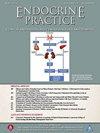Can Growth Hormone Stimulation Tests in Children Predict the Response to Growth Hormone Treatment?
IF 3.7
3区 医学
Q2 ENDOCRINOLOGY & METABOLISM
引用次数: 0
Abstract
Objective
The efficacy of growth hormone (GH) treatment in short, healthy children diagnosed with growth hormone deficiency (GHD) or idiopathic short stature (ISS) suggests an overlap between these 2 conditions. Although imperfect and inconsistent, GH stimulation testing (GHST) remains the primary diagnostic tool for differentiating GHD and ISS, influencing GH treatment eligibility and dosing. This study aims to assess the clinical significance of GHST by comparing the response to GH treatment in children diagnosed with GHD or ISS based on their GHST results.
Methods
A retrospective study in an endocrine clinic at a tertiary pediatric referral center comparing the response to GH treatment over 3 years in children diagnosed with GHD or ISS.
Results
Two hundred ninty-one children treated with GH, 97 children diagnosed with GHD, and 194 with ISS are included in the analysis. Height significantly improved, and insulin-like growth factor-1 levels increased independent of the GHST results, gender, or pubertal status (P < .001). When adjusting for dosage, height gain was not associated with the treatment indication, GHD or ISS, or GHST peak levels.
Conclusions
Our findings indicate similar responses to GH treatment in children classified as GHD or ISS based on GHST. These results suggest that the pivotal role of GHST in diagnosing and treating short children should be reconsidered.
儿童生长激素刺激试验能否预测对生长激素治疗的反应?
目的:生长激素(GH)治疗被诊断为生长激素缺乏症(GHD)或特发性身材矮小(ISS)的矮小健康儿童的疗效表明这两种情况之间存在重叠。尽管不完善和不一致,生长激素刺激试验(GHST)仍然是区分GHD和ISS的主要诊断工具,影响生长激素治疗的资格和剂量。本研究旨在通过比较诊断为GHD或ISS的儿童根据GHST结果对GH治疗的反应来评估GHST的临床意义。方法:在一家三级儿科转诊中心的内分泌诊所进行回顾性研究,比较诊断为GHD或ISS的儿童在三年内接受GH治疗的反应。结果:291例GH患儿,97例GHD患儿,194例ISS患儿纳入分析。身高显著改善,胰岛素样生长因子-1 (IGF-1)水平升高,与GHST结果、性别或青春期状态无关(结论:我们的研究结果表明,基于GHST分类为GHD或ISS的儿童对GH治疗的反应相似。这些结果提示GHST在诊断和治疗矮个子儿童中的关键作用应被重新考虑。
本文章由计算机程序翻译,如有差异,请以英文原文为准。
求助全文
约1分钟内获得全文
求助全文
来源期刊

Endocrine Practice
ENDOCRINOLOGY & METABOLISM-
CiteScore
7.60
自引率
2.40%
发文量
546
审稿时长
41 days
期刊介绍:
Endocrine Practice (ISSN: 1530-891X), a peer-reviewed journal published twelve times a year, is the official journal of the American Association of Clinical Endocrinologists (AACE). The primary mission of Endocrine Practice is to enhance the health care of patients with endocrine diseases through continuing education of practicing endocrinologists.
 求助内容:
求助内容: 应助结果提醒方式:
应助结果提醒方式:


